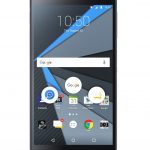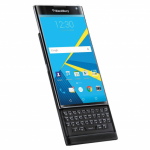BlackBerry ends smartphone development

BlackBerry used to be an incredibly successful smartphone maker, but the iPhone and Android changed that. Now, the company formerly known as RIM cannot even manage to sell a measly one million units in a quarter, let alone compete against players like Apple and Samsung.
So, with a market share hovering around the 0.1 percent mark, BlackBerry has decided to take a big step back, announcing that it will stop developing its own smartphones. Instead, BlackBerry will focus on a more lucrative market -- enterprise software services.
BlackBerry launches new subscription-based Android apps

Canadian telecommunications company Blackberry announced new services for its Android Hub+ platform this week. Besides the Hub, Calendar and Password Keeper, which were available earlier, another six apps are now available for Android users, for both Marshmallow and Lollipop versions of the operating system.
These apps include Contacts, Tasks, Device Search, Notes, and Launcher, all part of Blackberry's productivity suite. They are available for a free 30-day period, after which they'll cost 99 cents per month. Hub, Calendar, Password Keeper, and Launcher will remain free, but with ads.
BlackBerry claims its second Android smartphone is 'world's most secure'

BlackBerry's Priv, hasn't quite been a huge hit with consumers, but the company is not ready to give up just yet as it has introduced its second Android handset, called DTEK50. The selling point? BlackBerry claims that it is the "world's most secure Android smartphone".
The market for privacy and security-focused smartphones seems to be quite small -- insignificant, really -- if we are to look at how poorly Priv and Silent Circle's Blackphone have been selling so far. And it is hard to see how the new DTEK50 will change that.
BlackBerry readying three new Android smartphones

In what might be a last ditch effort to regain some of its former glory, BlackBerry is planning to release three new smartphones running Google’s Android OS.
Last year, the Canadian company launched its first smartphone running Android, the BlackBerry Priv. While it was well-received by critics for its implementation of Google’s OS, the smartphone with a slide-out keyboard was unable to sell well enough to turn the tide for BlackBerry, which has steadily declined since the release of Apple’s original iPhone.
PayPal focuses its efforts and drops Windows Phone app

Like many other companies, PayPal is questioning the value of investing time and money in Windows Phone -- or Windows 10 Mobile, if you prefer. As of 30 June, the PayPal app for Windows Phone will be no more.
At the same time, the company is also dropping the apps for Blackberry and Amazon Fire OS. PayPal says that users will have to rely on the mobile website as it focuses "resources in creating the very best experiences for our customers".
BBM finally gets video calling on Android, iOS

In an effort to remain competitive with rival messaging platforms, BlackBerry has decided to bring video calling to its cross platform BBM messaging apps.
Last week, it was unveiled that the Android variant of BlackBerry Messenger would be receiving the ability to make video calls as a beta feature. Now the company has announced that this feature will also be appearing on Apple’s iOS.
BlackBerry Priv gets Android 6.0 Marshmallow

Android 6.0 launched over half a year ago, but even today there are still lots of devices that have yet to receive the software upgrade to Marshmallow. In fact, at the beginning of this month fewer than one in 20 were running Google's latest mobile operating system.
For BlackBerry Priv users though things are looking up. The Canadian maker has announced the Marshmallow rollout for its first Android smartphone, introducing improvements to the camera, battery, privacy, security, and more.
BlackBerry will release two mid-range Android phones in 2016

BlackBerry will be moving back into the mid-range smartphone market in order to appeal to enterprise customers who were unable to justify the Priv’s $700 retail price.
John Chen, the company’s CEO, has revealed that BlackBerry is planning to release two mid-range Android smartphones during 2016. One will include a physical keyboard to appease fans of the company’s iconic handsets and the other will sport a full touchscreen to appeal towards consumers who have adopted the modern smartphone form factor.
Android can't make BlackBerry phones attractive again

Realizing that it stands no chance of attracting consumers with BlackBerry 10 OS devices, BlackBerry last year released a smartphone that runs Android. Called Priv, it offers an interesting mix of business and consumer-oriented features that make it a powerful contender in the high-end segment. Many folks seem to like it, but just how much of a success is it?
Priv has what it takes to be a big seller. It has all the right features that consumers say they want in a BlackBerry smartphone: premium build, physical keyboard, large screen, enterprise-friendly apps and, last but not least, Android. You would think that by giving people what they've asked for the company would be struggling to keep up with demand. And yet, in its last fiscal quarter, BlackBerry only sold a very small number of Priv units.
BlackBerry denies existence of security backdoors and blames 'cracked' encryption on user error

BlackBerry has spoken out to deny claims that its encryption has been cracked by groups associated with the police in the Netherlands. The company has long-prided itself on the level of security it offers, but that security has been called into question recently.
Reports circulated that Mexican drug lord El Chapo was able to be found partly because of his decision to use a BlackBerry (specifically a BlackBerry Z30, fact fans) to arrange interviews with actor Sean Penn. Coming after claims by the Netherlands Forensic Institute (NFI) that it had been able to decrypt hundreds of encrypted emails on a BlackBerry handset, the Canadian company felt compelled to respond -- by blaming user error.
BlackBerry will only release Android devices in 2016

BlackBerry has heralded the new year with a new move -- that is, to shift to Android for its upcoming devices in 2016.
In BlackBerry’s statement, company CEO John Chen said that its BB10 operating system will take a back seat this year as the company intends to launch two Android-powered devices to accompany the BlackBerry Priv.
BlackBerry's privacy stance is yet another reason to avoid the company

We are living in a post NSA-world (and I am a post-NSA girl...) and privacy is in the public consciousness more than ever before. After the government surveillance revelations that came courtesy of Eddy Snowden, most tech companies have been trying to stress to customers and clients just how willing they are to stand up for privacy.
But not BlackBerry. Company CEO John Chen has used a blog post to lash out at his contemporaries for supporting strong encryption. He makes a thinly-veiled reference to Apple, accusing that an unwillingness to comply with law enforcement requests put us all in a "dark place". Chen says that "our privacy commitment does not extend to criminals", seemingly failing to recognize that privacy is very much an all-or-nothing concept.
Government enterprise surveillance demands drive BlackBerry to quit Pakistan

BlackBerry wants nothing more to do with Pakistan. The Pakistani government had demanded that it be permitted to monitor BlackBerry Enterprise Service emails and BBM messages. Unwilling to bow to these demands, the company has decided to pull out of the country entirely.
From the end of 2015, BlackBerry will no longer operate in Pakistan as the company says that it does not want to compromise its customers' privacy. Unwilling to comply with surveillance directives or show any sort of support for backdoors, BlackBerry has decided to cut its losses and run.
SecuSUITE for Enterprise enables secure calling and messaging

BlackBerry and its subsidiary Secusmart have announced the release of SecuSUITE for Enterprise, a new voice encryption solution that protects mobile calls on the Android, iOS and BlackBerry operating systems.
By using the VoIP, software-based, cloud-hosted solution, employees will be able to conduct secure conversations worldwide and be able to send encrypted text messages of any length.
Priv is BlackBerry's last hope -- can it woo consumers and business users?

It’s fair to say that BlackBerry has been struggling a bit in recent times. After initially being a leading light in the smartphone arena last decade, it has since seen its main competitors go on to take control of the market.
The likes of Apple and Samsung are selling more phones than ever and are now -- and have been for some time -- the dominant forces in a world that BlackBerry is struggling to still be a part of. A report from earlier in the year said that Apple now enjoys a 34.1 percent share of the UK smartphone market, with Android leading the way 53.2 percent and BlackBerry bringing up the rear with 1.2 percent.
Recent Headlines
Most Commented Stories
© 1998-2025 BetaNews, Inc. All Rights Reserved. About Us - Privacy Policy - Cookie Policy - Sitemap.